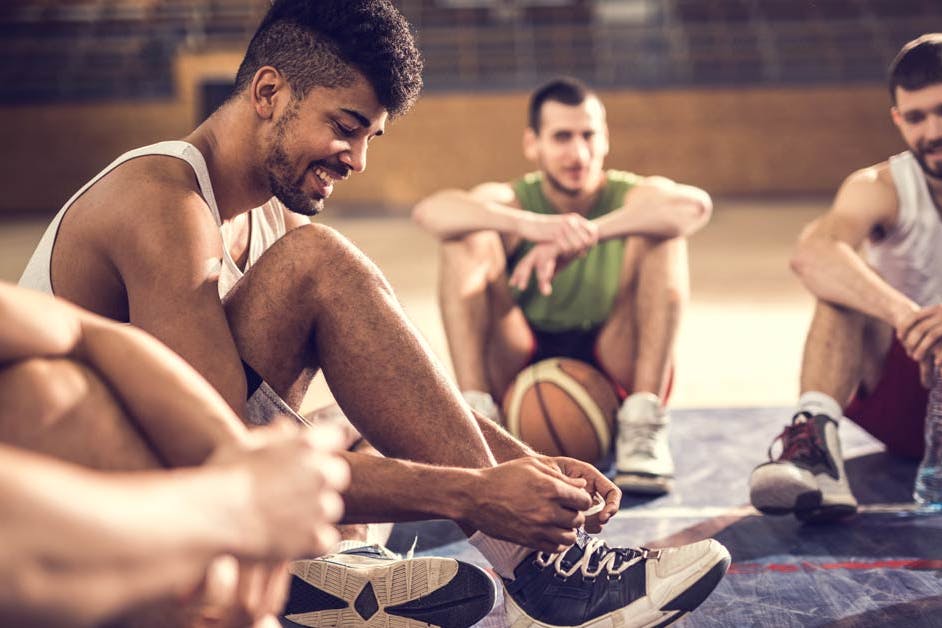Common Basketball Shoulder Injuries that Hurt Your Game (& Remedies)
Discover common basketball shoulder injuries and how to address these pains so you can experience long-term relief.

There’s nothing quite like hitting a pull-up jumper at the top of the key or taking your man to the hole for a finger roll finish. Unfortunately, shoulder pain can often keep you sidelined. Whether you want to get back on the court for your weekly pickup game or you’re training for the next big tournament, don’t let these common basketball shoulder injuries get the best of you.
Among basketball players, shoulder injuries don’t typically affect the bone. Rather, the shoulder pain comes from issues with the tendons, ligaments, and/or muscles.
For some patients, the pain worsens at night. For others, the shoulder pain is triggered when they lift their arm sideways. The pain may radiate from the base of the neck. Or it can be a constant throbbing shoulder pain that won’t go away.
3 Common Sources of Shoulder Pain

Love playing basketball with your friends and family? Don't let a shoulder injury get the best of you. Keep playing!
1. Rotator Cuff Tendonitis
Imagine turning a wrench over and over and over again. Each time you turn it, a small bit of damage occurs to the wrench. A bit of its surface may be scraped away or the shape might be warped slightly. It’s rare that any single turn has a drastic impact on the wrench. But over time, the damage adds up. The same can be true of your shoulder.
Overuse injuries are common among athletes. For basketball players, the repetitive motion often associated with shooting requires a lot from the shoulder socket – a complex network of muscles, tendons, and ligaments.
These overhead motions of practicing shot after shot can cause the socket to become irritated, leading to tendonitis, the “inflammation or irritation of a tendon.” This can cause a nagging shoulder pain, especially when lifting your arm sideways or overhead.
2. Bursitis of the Shoulder
Your bursa is a small sac filled with fluid. It’s located between the bones and tendons within your shoulder. This is what allows your shoulder socket to rotate smoothly.
Like tendonitis, the bursa can become inflamed from overuse. This can lead to swelling, which narrows the space within your shoulder socket, limiting your range of motion, pinching nerves, and often causing pain.
3. Rotator Cuff Tear
Like tendonitis and bursitis, rotator cuff tears can be the result of overuse. However, tears are more commonly connected to an acute injury (a sudden injury).
This kind of debilitating rotator cuff injury can be complete, such a full rip in a ligament or tendon within the rotator cuff. They can also be partial, with the ligament or tendon frying slightly.
It’s fairly uncommon to play through a complete or partial tear, as the pain and swelling can be quite severe. These types of partial and full rotator cuff tears are also among the common football shoulder injuries, particularly among quarterbacks and linemen.
Traditional Treatments Address the Pain

Pain can be debilitating when it's persistent. Don't let it get the best of you.
Traditional treatment remedies for common basketball injuries include:
- Cortisone injections
- Pain killers
- Surgery
There are instances when healing requires surgery. Full tears of multiple ligaments could leave you with little to no mobility in your shoulder. However, surgery presents risks, as it exposes complications due to Anesthesia, blood clots, and infection.
It’s also important to remember that surgery may not be effective. Furthermore, accessing the damaged area involves cutting healthy tissue.
On the flip side, pain killers and cortisone injections definitely provide immediate pain relief. However, they don’t address the cause of the pain. Instead, they mask the pain. This puts you at a significant risk of further damage, as your body is able to push further than it should.
Prolotherapy Offers a Non-Invasive Alternative to Pain Relief
Prolotherapy is a non-invasive treatment that helps trigger your body’s natural healing process. It uses a small irritant that’s injected at the site of the pain, such as within your shoulder muscles. The injection alerts the brain that there is an issue in the particular part of the body. It can stimulate the re-growth of muscles, ligaments, and tendons.
Patients with an average of 53 months of chronic shoulder pain, even those whose medical doctors told them there was no other treatment for their pain or that surgery was their only option, reported clinically relevant improvements in their pain level and quality of life.
Furthermore, the controlled study ‘Prolotherapy for Refractory Rotator Cuff Disease’ published in Physical Medicine and Rehabilitation revealed that patients receiving prolotherapy treatments “showed improvement in pain, disability, isometric strength, and shoulder AROM in patients with refractory chronic rotator cuff disease.”
Get Back on the Court

When your body heals, you can start doing the things you love most again - like playing pickup basketball with friends.
Whether you’re ready to start playing pickup with the lunchtime crowd again or you want to shoot hoops with your kids, it’s never fun to be sidelined by an injury. Schedule a consultation to start relieving your shoulder pain today and begin healing.



